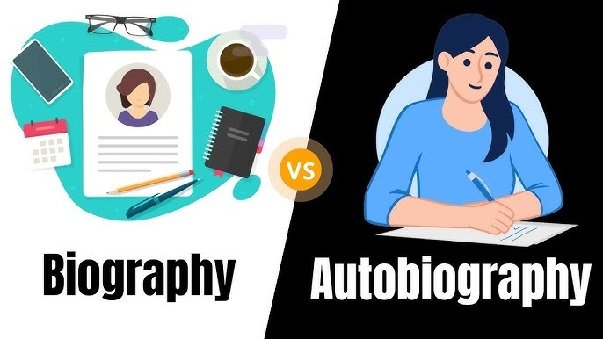Autobiography vs. Biography: Understanding the Key Differences

Autobiography
The terms autobiography and biography are often used interchangeably, but they have distinct differences in meaning, scope, and purpose. While both forms of writing serve the purpose of chronicling the life of an individual, the perspective, approach, and level of involvement of the author differ. In this detailed article, we will explore the core differences between an autobiography and a biography, shedding light on their unique characteristics.
What is an Autobiography?
An autobiography is a written account of a person’s life, authored by the individual themselves. The word “autobiography” comes from the Greek words “auto” meaning self, “bios” meaning life, and “graphein” meaning to write. Essentially, it is a self-written life story.
Key Characteristics of an Autobiography:
- First-Person Perspective: Autobiographies are always written in the first person, using pronouns such as “I” or “we”. The author narrates their own experiences, emotions, and personal insights.
- Subjective Nature: Since the author is writing about their own life, autobiographies often reflect personal opinions, emotions, and interpretations of events. This subjective nature can make the content more emotional and intimate, allowing readers to connect with the author on a personal level.
- Chronological Order: Most autobiographies are structured chronologically, beginning with the author’s early life and progressing through key events up to the present time or a significant point in their life. However, some may choose a thematic structure, focusing on particular experiences or themes.
- Firsthand Account: One of the main advantages of an autobiography is that it provides a firsthand account of events. The reader gets a direct insight into the author’s thoughts, motivations, and experiences.
- Personal Growth and Reflection: Autobiographies often highlight the author’s personal growth, struggles, and triumphs. It provides a platform for self-reflection and a deeper understanding of oneself.
Famous examples of autobiographies include “The Diary of a Young Girl” by Anne Frank and “Long Walk to Freedom” by Nelson Mandela.
What is a Biography?
A biography, on the other hand, is a written account of someone’s life, but it is written by someone other than the subject of the story. The biographer collects information through research, interviews, and other sources to portray the life of an individual.
Key Characteristics of a Biography:
- Third-Person Perspective: Biographies are typically written in the third person, using pronouns such as “he”, “she”, or “they”. The biographer tells the life story of the subject from an outsider’s perspective.
- Objective Representation: Unlike autobiographies, biographies are more objective. While they may include interpretations or insights from the biographer, the goal is often to provide a well-rounded and factual portrayal of the subject’s life.
- Research-Based: Biographers rely heavily on external sources for information. These sources may include interviews with the subject (if they are still alive), interviews with family, friends, and colleagues, letters, diaries, and other documents that provide insight into the subject’s life. This makes biographies well-researched and fact-checked.
- Focus on the Subject’s Impact: While autobiographies often focus on the author’s inner life and personal growth, biographies tend to emphasize the subject’s achievements, contributions, and impact on society or a specific field.
- Interpretation by the Author: Though biographies strive to be objective, the biographer’s interpretation of the subject’s life can influence the tone and focus of the book. The biographer’s perspective, cultural background, and research can shape how the subject is portrayed.
Famous biographies include “Steve Jobs” by Walter Isaacson and “Alexander Hamilton” by Ron Chernow.
Key Differences Between Autobiography and Biography
While both autobiographies and biographies aim to document an individual’s life, the major differences lie in authorship, perspective, and purpose. Here’s a breakdown of the key distinctions:
| Aspect | Autobiography | Biography |
|---|---|---|
| Authorship | Written by the subjects themselves | Written by someone other than the subject |
| Perspective | First-person | Third-person |
| Subjectivity | Highly subjective, with personal insights | More objective, based on external research |
| Research | Based on personal memories and reflections | Based on extensive research, interviews, and other sources |
| Structure | Often chronological, but can be thematic | Chronological or thematic, depending on the biographer’s approach |
| Purpose | Self-reflection, sharing personal experiences | Providing a detailed, researched account of the subject’s life |
Why Do People Write Autobiographies and Biographies?
Both autobiographies and biographies are powerful ways of sharing a life story, but the reasons for writing them can differ.
Why Write an Autobiography?
- Personal Reflection: Many individuals choose to write autobiographies to reflect on their life’s journey, exploring how their experiences shaped who they are.
- Legacy: Writing an autobiography allows individuals to leave behind a personal legacy, ensuring that their life story is told in their own words.
- Inspiration: People often write autobiographies to inspire others by sharing their struggles, challenges, and achievements.
Why Write a Biography?
- Historical Documentation: Biographies often serve as a way to document the life of a person who has had a significant impact on society, whether in politics, science, art, or other fields.
- Educational Purpose: Many biographies are written to educate the public about influential figures and the lessons we can learn from their lives.
- Storytelling: Biographers may be drawn to the dramatic or inspirational aspects of a person’s life and want to share their story with a broader audience.
Which is More Popular: Autobiography or Biography?
The popularity of autobiographies and biographies can vary depending on the subject matter and the author’s public profile. Autobiographies are often more intimate and personal, which appeals to readers looking for an emotional connection. In contrast, biographies are often viewed as more informative and educational, appealing to those interested in a more objective, researched perspective.
While both genres have their unique audience, biographies tend to dominate in academic and literary circles due to their emphasis on research and factual accuracy. Autobiographies, however, are favoured by readers who want an emotional and personal narrative directly from the individual.
Conclusion
In summary, autobiographies and biographies offer two different but equally fascinating ways to explore the life of an individual. While an autobiography provides a firsthand, introspective look at a person’s life, a biography delivers an objective, well-researched account from an outsider’s perspective. Both forms of writing are essential for preserving the stories of notable figures, each offering its own set of insights and takeaways for readers.
Read More: How Old Would Marilyn Monroe Be Today?






